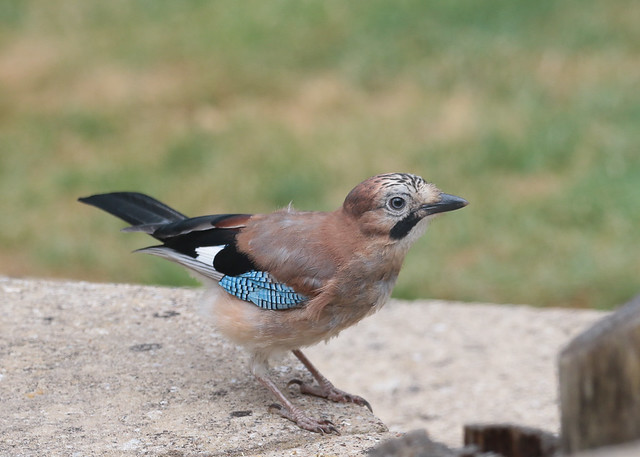
Here’s a recording in a mystery language.
Do you know or can you guess the language, and do you know where it’s spoken?

Here’s a recording in a mystery language.
Do you know or can you guess the language, and do you know where it’s spoken?
The words forward, backward, eastward and westward all share the suffix -ward, which indicates a course or direction to, or motion or tendency toward.

Word cloud created with Free World Cloud Generator
-ward comes from the Old English -weard (in the direction of, toward), from Proto-Germanic *wardaz, from *warþaz (turned toward, in the direction of, facing), from the Proto-Indo-European *wert- (to turn, wind) [source].
Other directional words the feature this suffix include: inward, outward, northward, southward, leftward, rightward, homeward, seaward, landward and awkward [source].
Awkward?? What direction is that?
Awkward means:
Originally it meant “in a backwards direction” [source].
Awk is an obsolete word that means:
Awk comes from the Old Norse ǫfugr (turned backwards), from the Proto-Germanic *abuhaz (turned the wrong way, inverted; wicked, bad) [source].
Words from the same root include öfugur (reversed, inverted, backwards, wrong) in Icelandic, and äbich (inside out) in German [source].
So being awkward means you’re going backwards or heading in the wrong direction. That’s fine with me – I am a bit awkward sometimes, particularly in social interactions and situations, or you could say that I just go in my own direction.
I’ve been asked to let you know about IndyLan (Mobile Virtual Learning for Indigenous Languages), a new EU-funded app developed to promote Scots, Scottish Gaelic, Cornish, Northern Saami, Basque and Galician languages and the cultures.
It’s available on iOS and Google Play, and the developers are looking for users who speak these languages to test it. Can you help?
You can provide feedback to them on this questionnaire.
More information:
I might just try to learn some of these languages – I’ve already learnt quite a bit of Scottish Gaelic, and some Scots and Cornish, and would like to learn more.

Here’s a recording in a mystery language.
Do you know or can you guess the language, and do you know where it’s spoken?
If I described someone as “keeping a hedgehog in their pocket”, what do you think I meant?
Well, the Welsh idiom “Mae e’n cadw draenog yn ei boced”, which literally translates as “he keeps a hedgehog in his pocket”, means that he is stingy or tight with his money [source].
There are many ways to say that someone is averse to spending money in English, including: frugal, miserly, thrifty, cheap, close-fisted, economical, ironfisted, mean, parsimonious, pennywise, tightfisted [source] or to have deep pockets and short arms.
Other ways to say someone is careful with their money in Welsh include:
Sources: Geiriadur yr Academi, Geiriadur Prifysgol Cymru
In French a miserly person is said to “avoir des oursins dans le porte-monnaie / la poche” (to have sea urchins in the wallet / purse / pocket) [source].
Do you know any other interesting idioms with a similar meaning?
You could say that I usually keep a hedgehog in my pocket (idiomatically, not literally), as I do tend to be careful with my money. At the moment I’m spending quite a bit on the studio that’s being built in my garden, and I can do this because I have savings I can dip into. The walls are now more or less finished and the roof will be installed this weekend. Parts for the roof include planks up to 6m long, with were quite a challenge to get through the house into the garden.

Here’s a recording in a mystery language.
Do you know or can you guess the language, and do you know where it’s spoken?
According to The Phrase Finder, the phrase the grass is always greener on the other side of the fence:
expresses the idea that other people’s situations always seem better than one’s own. The proverb carries an implied warning that, in reality, the grass is equally green on one’s own side and that you should be satisfied with what you have.
It’s earliest known appearance in print was apparently on 24th February 1917 in the Kansas Farmer – The Farm Paper of Kansas:

A song written in 1924 by Raymond B. Egan and Richard A. Whiting was titled The Grass is Alway Greener (In The Other Fellow’s Yard).
Other versions of the phrase appeared before then. For example, in The New York Times in June 1853:
It bewitched your correspondent with a desire to see greener grass and set foot on fresher fields.
However, according the English Language & Usage, the ideas expressed by the phrase are a lot older than that. For example, in Ovid’s poem Ars Amatoria (The Art of Love) Book I Part IX, which was written in 2 AD, he says:
Fertilior seges est alienis semper in agris,
Vicinumque pecus grandius uber habet.
Translations of this include:
Here are versions of the expression in other languages [source].
French:
Spanish:
Portuguese:
Welsh:
Irish:
Scottish Gaelic:
Korean:
Are there interesting equivalents of this phrase in other languages?
Here’s a song I wrote in October 2023 called ‘The Other Side’ based on this saying:

Here’s a recording in a mystery language.
Do you know or can you guess the language, and do you know where it’s spoken?
The English word ruche [ɹuʃ] means a gathered ruffle or pleat of fabric used for trimming or decorating garments [source], or to flute, pleat or bunch up (fabric) [source].
It comes from the French word ruche [ʁyʃ], which means a (bee)hive, ruffle or flounce, and comes from the Middle French rusche (beehive), from the Medieval Latin rusca (bark), from the Gaulish *ruskā, from the Proto-Celtic *rūskos (bark, beehive) [source], from the Proto-Indo-European h₃rewk- (to dig (up), till) [source].
Words from the same Proto-Celtic root include:
Sources: Grand Terrier Edition Skol Vreizh, TERMOFIS, catalandictionary.org, gerlyver kernewek, ReversoDictionary, teanglann.ie, On-Line Manx Dictionary, Bokmålsordboka | Nynorskordboka, Am Faclair Beag, Svenska Akademiens Ordböcker, Geiriadur Prifysgol Cymru
What do the words care and garrulous have in common?
Well, care comes from the Middle English care (grief, sorrow), from the Old English caru/ċearu (worry, anxiety, care, sorrow, grief), from the Proto-West-Germanic *karu (care, worry), from the Proto-Germanic *karō (complaint, lament, grievance, moan, worry, sorrow, care, concern), from the Proto-Indo-European *ǵeh₂r- (to shout, call, cry; voice) [source].
Garrulous (excessively or tiresomely talkative) comes from the Latin garrulus (talkative), from garriō (I chatter, prattle), from the Proto-Indo-European *ǵeh₂r- (to call, cry), which is apparently of imitative origin [source].

Pictured above is a Eurasian Jay, also known as Garrulus glandarius – the garrulus part means chattering/noisy and the glandarius part means “of acorns”.
So, they come from the same PIE root, via different paths. Other words from the same root include [source]:
The English word slogan also comes from the same root, or at least part of it does. It comes from sloggorne/slughorn(e) (battle cry), from the Scottish Gaelic sluagh-ghairm [ˈsl̪ˠuəɣərəm] (slogan, war cry), from the Old Irish slúag/slóg (army, assembly, crowd) and gairm (call, cry).